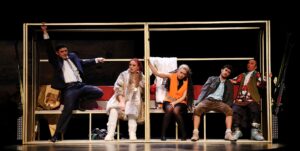
The Haydn Foundation Bolzano 2024 Review: Lorit. An Opera For The End Of Time
Marius Binder & Robert Prosser Produce A Lesson About The Dangers Of Mass Tourism
By Alan Neilson(Photo: MoniQue)
Composer Marius Binder and librettist Robert Prosser see their new opera, “Lorit,” as a modern version of the mediaeval mystery play, in which allegorical figures embodying present-day values and behavioral traits are used to educate the audience. The plays were re-enactments of well-known religious stories containing issues that would have weighed upon the mediaeval mind, such as The Last Judgement, and this is what Binder and Prosser have sought to achieve with “Lorit.” Rather than religious themes, however, which no longer obsess the minds of present-day audiences, their focus is on identity and the existential threat of environmental breakdown, set against the background of the effects of mass tourism.
A Relevant & Dramatically Coherent Narrative
The narrative, set in Tyrol, concerns five allegorical characters who are stranded in a cable car during a storm, comprised of The Beautiful Landscape, Tourism, The Last Generation, The Businessman, in the form of the owner of the cable car company, and a non-singing role who plays Death and The Crowd. Following some light-hearted interactions, the mood quickly changes as they are forced to interact with each other on more than just a superficial level. At first, the underlying conflicts that exist between them rise to the surface, but after a short period they give way to a spirit of cooperation as the characters realize that they have a shared interest. Their mood quickly improves, and they declare themselves to be an independent state called Lorit (the backwards spelling of Tirol). In fact, such is their optimism, they treat the approach of a rescue party with hostility.
The relationships between the characters, as directed by Christina Constanze Polzer, were well-crafted and brought out the real conflicts that lie buried beneath the everyday pleasantries that are widely adopted by everyday people yet do not reflect their long-term nor their immediate interests. So, we watch The Beautiful Countryside naively flirting with Tourism, egged on by the cynicism of The Businessman. All seems to be contentment and joy. Even The Last Generation, who is aware of the coming environmental and societal breakdown, is happy to indulge herself in a little hedonism.
The storm shakes them from their carefully constructed delusional state. The winds rocked the cable car, the doors started banging open and shut, the lights flashed, and the music became wild. The fearful passengers are thrown together, and they start to change. The Beautiful Countryside, for example, sheds her naivety as she starts to realize how she is being exploited by The Businessman and Tourism. Eventually, through cooperation, they see that a future lies in Lorit.
Unfortunately, this is no utopia; Death and the demanding, unthinking Crowd are an ever present, watching on as the celebrations to mark the new state take place. It is a doomed enterprise; the old conflicts quickly reassert themselves. The Businessman attempts to force his leadership on the group. The bonds that hold the community together fragment. There can be no solution when everyone sells their identity to support mass tourism, which offers people nothing apart from money. The Beautiful Countryside knows that there is no future and abandons the cable car. She is followed by each of the other characters in turn, including members of the orchestra, as they each leave the stage, until the only thing left is Death.
It was a neatly constructed and well-presented drama. Polzer’s direction was sensitive to the changing moods, while her handling of the characters was sharp and insightful. Julie Neuhold, the scenographer and costume designer, did a fine job with limited resources, centering her presentation, unsurprisingly, on the cable car, which she used in an imaginative fashion by shifting from the inside to the outside through a series of rapid set movements carried out by the singers. Luca Bellemo’s lighting designs successfully added to the atmospheric effects.
An Ending with a Dramatic Flourish that Mis-fired
If the drama had ended with Death, alone on stage, staring out at the audience, it would have brought the work to a satisfying conclusion. Unfortunately, Death had a long monologue to present, and in the space of what was about five minutes, it might have been less, but it felt longer and destroyed the entire ending. It was little more than a didactic speech, which turned “Lorit” from a work of art into a piece of quasi-propaganda and gave the impression that its creators did not trust the audience to interpret the work for itself. There was no ambiguity, no loose ends. It was all tied up neatly so that the audience could leave the theatre without any need for further thought. Maybe Binder and Prosser became too entangled with the aims of the mystery plays, in which education was a fundamental goal.
More of a Traditional Work than the Composer May Wish to Admit
In a recent interview with OperaWire, Binder explained his ideas on composition, and they did not sound particularly appealing; he talked at length about using music to create a concept, about preferring experimentation, and rejecting the use of a compositional style as such. He stated that he was more interested in successfully presenting a concept than in pleasing the audience. What he actually produced, however, was easily accessible music that moved fluidly between styles, taking in traditional Tyrolean folk, cabaret, and even, at one point, the music of Broadway. On occasions, the influence of Kurt Weill could clearly be heard. Of course, everything was put through Binder’s own interpretative lens, and there was plenty of atmosphere music aimed at heightening the dramatic and emotional content of the text, but the results were quite pleasing; certainly, they did not alienate the audience at all.
At the beginning of the opera, an off-stage traditional Tyrolean yodeler could be heard, which quickly came under attack by aggressive, disjointed sounds from the orchestra, which summed up both the general musical style of the work, in which traditional forms were subjected to unexpected twists and turns, and the narrative as a whole, in which Tyrolean traditions and its ways of life were under attack from the consequences of mass tourism.
The musical director, Christoph Huber, conducting members of the Haydn Orchestra of Bolzano and Trento produced an energetic, sensitive and atmospheric performance that caught the ease of the comfortable melodies that sprung up here and there throughout the piece as well as its quickly changing atmospheric qualities, based largely around atonal passages with angular and aggressive sounds, although never allowed to reach the point of excess; the melodies or the appeal of the vocal line were always on hand to keep the score grounded.
A Fully Engaged & Convincing Cast
The four singers were excellent. Each produced a strong, clearly defined performance that brought their character to life, and together they created a group that interacted well to promote the drama.
Laura Schneiderhan, in the role of The Beautiful Landscape, produced a wonderful interpretation that successfully captured the development of her character as she awakened to a reality to which she had hitherto been oblivious. Initially naïve, enthusiastic and flirtatious, her singing was light, happy and bright and she engaged with the other characters in a light-hearted, positive manner. As reality started to impose itself and her realization that she was complicit in her own destruction grew, the voice became sharper, more strident and less bubbly, which helped transform her into a more serious, deeper character.
Manuel Ried, playing Tourism, played up the role of the tourist as a consumer who has no understanding of or connection to the place they visit. They are there to enjoy themselves, take away superficial impressions, and move on to their next destination without any consideration of the effects their behavior has on the community. Ried, costumed in typical Tyrolean dress, loved The Beautiful Landscape, and indulged in some traditional Tyrolean dancing; he had the full tourist experience and could now say he ‘knew’ the Tyrol. He possesses a pleasing tenor with a beautiful lyrical quality that he could easily present in a superficial manner, which neatly defined his role. The storm came as quite a shock; he had not signed up for it! After which, his singing became more animated as he imbued his singing with a greater degree of honest emotion.
Soprano Milena Pumberger produced a forceful and assertive performance as The Last Generation. She used her clear, expressive voice to portray her character as a demanding, anxious and generally unhappy character who is oppressed by a sense of oncoming doom. Her relationship with The Businessman was particularly fraught, and the confrontations were stressful affairs, in which she used the piercing, steely quality of her voice to heighten the tension. The Last Generation may be pessimistic about the future, but that did not stop her from embracing the hedonistic atmosphere that occasionally gripped the characters, which allowed her to show off the lyrical beauty of her voice.
Baritone Jubin Amiri, in the role of The Businessman, who owned the cable car company and, therefore, lived directly off the tourists who flood the Tyrol every year, produced a suitably smarmy and manipulative portrait. He was thoroughly dislikable; he was exploitative, aggressive, materialistic and bullying. The relationships with the other characters were all based on what he could gain from them, nothing else. What made his characterization so successful, however, was the beautiful quality of his voice, with its silky, warm timbre that lies so easily on the ear; he really did sound like a decent, good-natured and endearing fellow. His voice also possessed depth with a degree of gravitas, so that when he tried to assert his will over Lorit, he did sound like a natural leader. At the end, he too succumbed to the general air of despair, which allowed him to display other aspects of his voice before he abandoned the cable car.
Bernard Wolf, as Death and the Crowd, had a strong presence, although he did not speak until the final scene. He watched on and involved himself in the goings-on that took place in the cable car but was always sufficiently distant and aloof to assert his sense of separateness from the others. He delivered the final monologue well but was unable to turn it into anything other than a sermon.
This was Binder’s first opera, and it was not at all bad. The score was interesting and accessible, and it successfully promoted the drama, which itself was neatly crafted, apart from the disastrous final scene that should be cut, or at least rewritten, for any future production.



